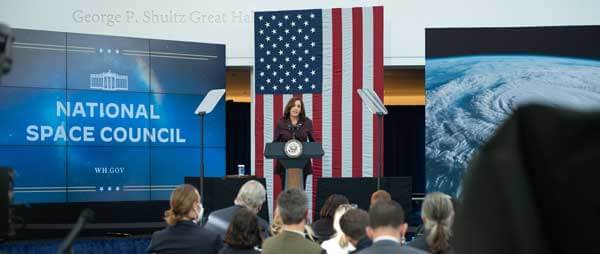
WASHINGTON (NASA PR) — Vice President Kamala Harris chaired the first National Space Council meeting of the Biden-Harris Administration Wednesday, Dec. 1 at the U.S. Institute of Peace in Washington. Prior to the meeting, President Biden expanded the number of participants of the council by executive order, reflecting the Biden-Harris administration’s broad priorities and creating the largest, most diverse space council in the nation’s history.
During the meeting, Vice President Harris led a discussion about how the United States should capitalize on opportunities in space, including promoting peaceful exploration and reducing the risk of miscalculation or conflict in space, addressing the climate crisis, and building a stronger STEM workforce.
“Today, our nation and our world are more active in space than ever before,” Vice President Harris said. “In this new era, we must see all the ways in which space can benefit Earth. We must see all the ways in which space can benefit the people of our nation and of all humanity. This perspective is central to our work as a council because, while exploration of space defined the 20th century, the opportunity of space must guide our work in the 21st.”
NASA Administrator Bill Nelson reflected on the agency’s STEM initiatives to support job creation and maintain America’s innovative and competitive edge.
“Just look at the sparkle in the eyes of children when the topic of space and spaceflight come up. It opens their little eyes into working to get involved. We saw that was the case with the Apollo generation. For a couple generations thereafter, look at the mathematicians and the technicians,” Nelson said. “[NASA has] paid interns and fellows. We get them in. We have them work with NASA professionals. They work on hardware … they do 3D manufacturing. As a result of that, 30% of our interns come to work for NASA. That’s why STEM is so important.”
Nelson highlighted the breadth of NASA’s STEM engagement, from the more than 6,400 internships, fellowships, and other direct student higher education awards made in the last year alone, to the $35 million in direct financial support to students enrolled in higher education programs.
Vice President Harris also announced the release of the United States Space Priorities Framework, which will guide the council’s efforts to develop and implement national space policy and strategy.
A recording of the meeting is available on NASA’s YouTube channel:
– Advertisement –